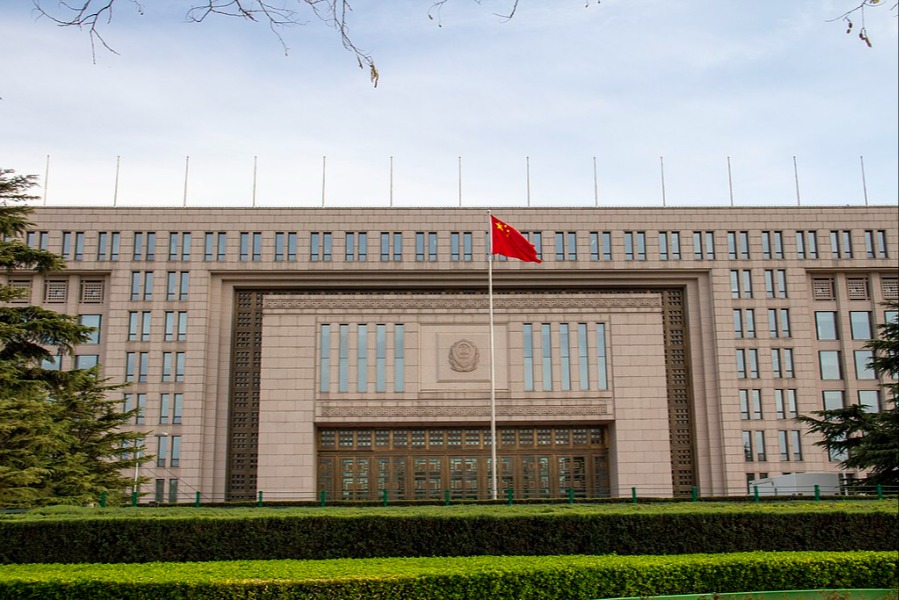Personal Jurisdiction Over Foreign States and State-Owned Enterprises
Conventional wisdom and many lower court cases hold that foreign states are not entitled to constitutionally based personal jurisdiction protections in federal courts because they are not “persons” protected by the Fifth Amendment. That reasoning is incorrect as a matter of constitutional text and history, and it leads to poor results as a matter of policy for reasons explored at length in a forthcoming article and summarized here.

Published by The Lawfare Institute
in Cooperation With

Conventional wisdom and many lower court cases hold that foreign states are not entitled to constitutionally based personal jurisdiction protections in federal courts because they are not “persons” protected by the Fifth Amendment. That reasoning is incorrect as a matter of constitutional text and history, and it leads to poor results as a matter of policy for reasons explored at length in a forthcoming article and summarized here.
As some readers know, foreign states are subject to suit in the United States only as permitted under the Foreign Sovereign Immunities Act (FSIA). The statute generally requires a nexus between the lawsuit and the United States, although sometimes that nexus is weak, raising issues of personal jurisdiction. For example, states designated as state sponsors of terrorism may be sued under the FSIA for some terrorist acts committed abroad; foreign states may be sued under the statute for commercial conduct abroad if it has “direct” but unforeseeable and minimal effect in the United States; and a foreign state (or state-owned enterprise otherwise entitled to immunity) may be sued to confirm a foreign arbitration award involving conduct abroad. The FSIA functions as a long-arm statute and confers personal jurisdiction on federal courts if its requirements are met. But does the Constitution impose additional limitations on the exercise of personal jurisdiction over foreign states, such as minimum contacts and reasonableness?
Lower courts have said no. Several courts of appeals have held that foreign states are not entitled to constitutionally based personal jurisdiction protections, and neither are foreign state-owned enterprises if they function as the alter ego of the foreign state. The Supreme Court has held that other foreign entities, including corporations, are entitled to constitutionally based personal jurisdiction protections, at least under the Fourteenth Amendment. The upshot is that when it comes to personal jurisdiction, the Palestine Liberation Organization has constitutional rights but Israel does not, and the Daimler Corp. has constitutional rights but Germany does not. In other contexts, courts have been very solicitous of the interests of foreign sovereigns—but when it comes to personal jurisdiction, foreign states are denied the constitutional protections afforded to other litigants.
The basis for this counterintuitive doctrine is the claim that foreign states are not “persons” protected by the Fifth Amendment Due Process Clause, and that they are accordingly are not entitled to constitutionally based personal jurisdiction protections. The Supreme Court suggested as much in dicta in Republic of Argentina v. Weltover when it reasoned that:
[a]ssuming, without deciding, that a foreign state is a “person” for purposes of the Due Process Clause, cf. South Carolina v. Katzenbach, 383 U.S. 301, 323–324 (1966) (States of the Union are not “persons” for purposes of the Due Process Clause), we find that Argentina possessed “minimum contacts” that would satisfy the constitutional test.
Before Weltover, courts and government officials assumed that foreign states were entitled to constitutionally based personal jurisdiction protections. After Weltover, they have held or assumed exactly the opposite. But Weltover’s dicta is cursory, and a careful analysis of constitutional text and history, undertaken for the first time here, demonstrates that foreign states are entitled to the constitutionally based personal jurisdiction defenses available to other defendants. Foreign states are protected by the personal jurisdiction limitations in Article III itself, and they are also “persons” entitled to “process” protections under the Fifth Amendment.
Article III Requires Personal Jurisdiction
The Fifth Amendment’s requirement of due process is the well-known source of important procedural protections for litigants in federal court, including the requirements of personal jurisdiction and notice. Focusing on foreign sovereigns reveals an additional, largely neglected basis for litigation-related constitutional rights in federal courts: Article III. This source of protection is of particular importance to foreign sovereigns because they are entitled to any procedural limitations baked into Article III, whether or not they are “persons” under the Fifth Amendment.
As it turns out, Article III not only limits the subject matter jurisdiction of the federal courts but also provides procedural protections such as notice and personal jurisdiction. The key is that Article III confers on the federal courts only “judicial power” over “cases” (and controversies). Both terms allow federal courts to act only when a defendant is properly brought before them. As John Marshall explained in 1800, to have a “case” there “must be parties to come into court, who can be reached by its process.” Note in Marshall’s language the textual link between the Fifth Amendment requirement of “process” and Article III’s conferral of judicial power that extends to certain “cases.” To have a “case,” there had to be a defendant over whom the court had personal jurisdiction, meaning that the defendant must be reached by “process.”
The connection between the “judicial power” language in Article III and personal jurisdiction is made clear in a 1799 opinion of the U.S. attorney (1 U.S. Op. Atty. Gen. 87), which analyzed whether process could be served on a person on board a British war ship docked in New York City. The opinion reasons that:
It may be assumed, as a doctrine perfectly and incontrovertibly established, that the judicial power of a nation extends to every person and everything in its territory, excepting only such foreigners as enjoy the right of extraterritoriality, and who, consequently, are not looked upon as temporary subjects of the State.
The judicial power extends to persons and things in the territory of the state—that is, persons and things over which the court has jurisdiction. In a modern personal jurisdiction case, a plurality of the Supreme Court used the phrase coram non judice to connect “judicial power” and personal jurisdiction. According to the plurality, that phrase, applied when the courts lacked personal jurisdiction (or subject matter jurisdiction), refers to a proceeding that was not a judicial proceeding at all.
Foreign states, and all other parties brought before federal courts, are fully entitled to the protections afforded to litigants by Article III itself. Recall that those who opposed the Bill of Rights (of which the Fifth Amendment is a part) did so on the grounds that it merely duplicated limitations on governmental power already provided by the Constitution itself, as Alexander Hamilton argued in The Federalist Papers No. 84. Consistent with Hamilton’s argument, some Fifth Amendment procedural protections were part and parcel of the limitations on judicial power in Article III. Those restraints on government power apply to everyone, not just those who qualify as “persons” under the Fifth Amendment
The Foreign State as a Fifth Amendment “Person” Entitled to “Due Process”
Foreign states are also persons entitled to due process under the Fifth Amendment. Many sources from the 18th and early 19th centuries discuss whether or not “process” reached foreign states and their property in a variety of different factual situations. For example, in a 1796 case involving a French government vessel called The Cassius—described in more detail by Chimène Keitner here—the federal district attorney argued that “process of information and seizure” against the vessel “brings the sovereign to submit to the tribunal” and that there was no jurisdiction over the vessel. Comparable language was used to refer to U.S. states. A 1781 Pennsylvania state court case against the state of Virginia, Nathan v. Virginia, used the term “process” to describe Pennsylvania’s lack of personal jurisdiction over Virginia, reasoning (with a citation to international law treatises) that “all its process against [Virginia], must be coram non judice, and consequently void.”
When the Fifth Amendment was adopted, readers accordingly had every reason to connect the word “process” in the Fifth Amendment with foreign states sued in U.S. courts. The amendment’s use of the word “person” in the Fifth Amendment did not limit the otherwise straightforward application of due process rights to foreign states. Indeed, the term “person” was used to refer to a range of legal entities, including states, foreign states and corporations. For example, Emer. de Vattel, an international law scholar whose book “The Law of Nations” was very well known to the drafters of the Constitution, referred to nations as “moral persons” and also reasoned that “[a]ll those who form a society, a nation being considered by foreign nations as constituting only one whole, one single person[.]” States, foreign states and corporations were all referred to as “bodies” and “persons.” Nikolas Bowie and Sarudzayi M. Matambanadzo have emphasized in different contexts the close relationship between corporations and “bodies” politic, language that applied to states and nation-states alike.
Why Provide Constitutionally Based Personal Jurisdiction Protections to Foreign States?
Even if the text and history of the Constitution are clear that foreign states are entitled to constitutionally based personal jurisdiction protections based on both Article III and the Fifth Amendment, perhaps there are strong policy reasons to deny them such protections today. As an initial matter, affording litigation-related protections to foreign states is not an accidental feature of the U.S. Constitution. Even a cursory reading of Article III reveals a strong focus on using the jurisdiction of the federal courts to protect foreign parties of all kinds. Whether citizens of different states, U.S states, ambassadors or foreign states—all are specifically named in Article III. Article III even puts cases between foreign states and U.S. states within the original jurisdiction of the Supreme Court, as I described here. The purpose was to avoid friction with other countries by providing a fair forum for dispute resolution.
Modern courts and commentators have reasoned that personal jurisdiction should not protect foreign states because they are sui generis entities whose relationships with the United States are governed not by the Constitution but by international law. But those relationships might be regulated by both the U.S. Constitution and international law, and both might govern in the same case. The Constitution might require that courts have personal jurisdiction under whatever law is applicable, for example, but international or general law might set out the actual limits on personal jurisdiction. Similarly, a relationship governed by both constitutional law and international law might be analogized to cases in which procedure is governed by one source of law and substance by another.
Courts have also reasoned that because U.S. states are not entitled to due process rights under Katzenbach, foreign states must not be entitled to such rights, either. The foregoing discussion casts doubt on the broad claim that the U.S. states could never be categorized as “persons” for Fifth Amendment purposes. But even assuming that Katzenbach is well settled under stare decisis, the decision was not about personal jurisdiction, and it did not mandate the equal treatment of states and foreign states. Rather, it rested on the specific relationship between domestic states and the United States and is explicitly limited to “States of the Union.” The Supreme Court’s reasoning that separation of powers should protect those persons and groups “who are particularly vulnerable to non-judicial determinations of guilt” puts U.S. state and foreign states on different footing because foreign states are not entitled to many of the institutional protections to which U.S. states are entitled.
Putting foreign states and foreign corporations on equal footing for constitutional purposes has the advantage of resolving the difficult issue of how to categorize state-owned enterprises. Lower courts have applied the Supreme Court’s reasoning in First National City Bank v. Banco Para el Comercio Exterior de Cuba (Bancec), which assumes that “government instrumentalities established as juridical entities distinct and independent from their sovereign should normally be treated as such.” That presumption of separateness can be overcome by showing that a foreign “corporate entity is so extensively controlled by its owner that a relationship of principal and agent is created,” or that separate treatment of the entities “would work fraud or injustice.” These standards are very difficult to meet. They also have nothing in particular to do with the Constitution. The rule announced in Bancec is a federal common law rule based on public international law, comity and domestic corporate law, and on the history of the FSIA. Lower courts have constitutionalized the rule with no analysis of the Fifth Amendment or what the rule has to do with the meaning of the word “person”—the ostensible basis for the constitutional distinction between foreign private corporations and foreign states.
The Fifth Amendment and Contemporary Personal Jurisdiction Doctrine
Foreign nations have due process rights and are entitled to procedural protections under Article III, including constitutionally based personal jurisdiction protections, as described above. But the content of those rights is a distinct issue—and one that remains an open question for all defendants. The Supreme Court has held that Fourteenth Amendment due process requires personal jurisdiction that is based on minimum contacts with the forum state and is reasonable. But the Supreme Court has not determined what is required by Fifth Amendment due process. Although the Supreme Court has not addressed the issue, lower courts have often assumed or held that the Fifth and Fourteenth Amendments impose comparable limitations, except that the “territorial referent” is the entire U.S. for the Fifth Amendment, and the forum state for the Fourteenth Amendment, as A. Benjamin Spencer has described here. There is widespread dissatisfaction with the Fourteenth Amendment minimum contacts analysis, and the Supreme Court should hesitate before importing it into the Fifth Amendment or into Article III requirements of personal jurisdiction.
The better approach may be to conclude that both Article III and the Fifth Amendment require federal courts to have personal jurisdiction under applicable rules but that they do not supply the content of those rules. This might be called a “positivist” limitation on federal judicial power. Other scholars, including Stephen Sachs, have made versions of this argument in the due process context. Cases involving personal jurisdiction over foreign sovereigns provide some support, because they reason that the jurisdictional rules can be changed by Congress. Note that if this view is adopted, the outcomes of cases against foreign sovereigns will not change—sovereigns are constitutionally entitled to personal jurisdiction, but only the personal jurisdiction protections that Congress chooses to give them under the FSIA (or other statute). The outcomes of some cases against other defendants might change because they are not entitled to minimum contacts, contrary to the current approach of lower courts. Recall, however, that the Supreme Court has not resolved the issue.
Positivist protections are minimal, but they are also not nothing. They would prevent arbitrary actions of federal courts, and they comport with the general 18th century views of parliamentary supremacy. Congress would likely continue to afford foreign states generous jurisdictional protections, as it has already done in the FSIA, with a few exceptions. That decision would rest with Congress, not the courts, so that any international friction that arises would result not from shaky constitutional lines drawn by the courts but, instead, from the actions of Congress. If minimum contacts and reasonableness are the touchstones of Fifth Amendment due process and even of Article III, then foreign states are fully entitled to those protections, just as any other defendants.
In the late 18th century, foreign states were both an important audience for the Constitution and a menacing source of potential conflict for the fledgling nation. To insulate the United States from conflict, the Constitution included certain protections for those foreign nations, rather than excluding them categorically. Foreign states benefited from the extension of federal judicial power to include foreign-state diversity jurisdiction as well as an entitlement to due process under the Fifth Amendment.
But modern cases have lost sight of these basic features of the Constitution. Instead, they have developed a messy set of ahistorical doctrines that generate unpredictability without serving important policy goals.
Viewing litigation-related constitutional rights from the perspective of foreign states draws together parts of the Constitution in ways that scholars have not yet done, in particular Article III and the Fifth Amendment. The foreign-state vantage point also shows the link between personal jurisdiction and due process for all defendants—a connection that scholars often describe as unclear or mysterious. Cases involving foreign sovereigns illustrate that “process” meant a territorially restricted power to compel attendance before the court, linking the term “process” to sovereign power and to personal jurisdiction.





